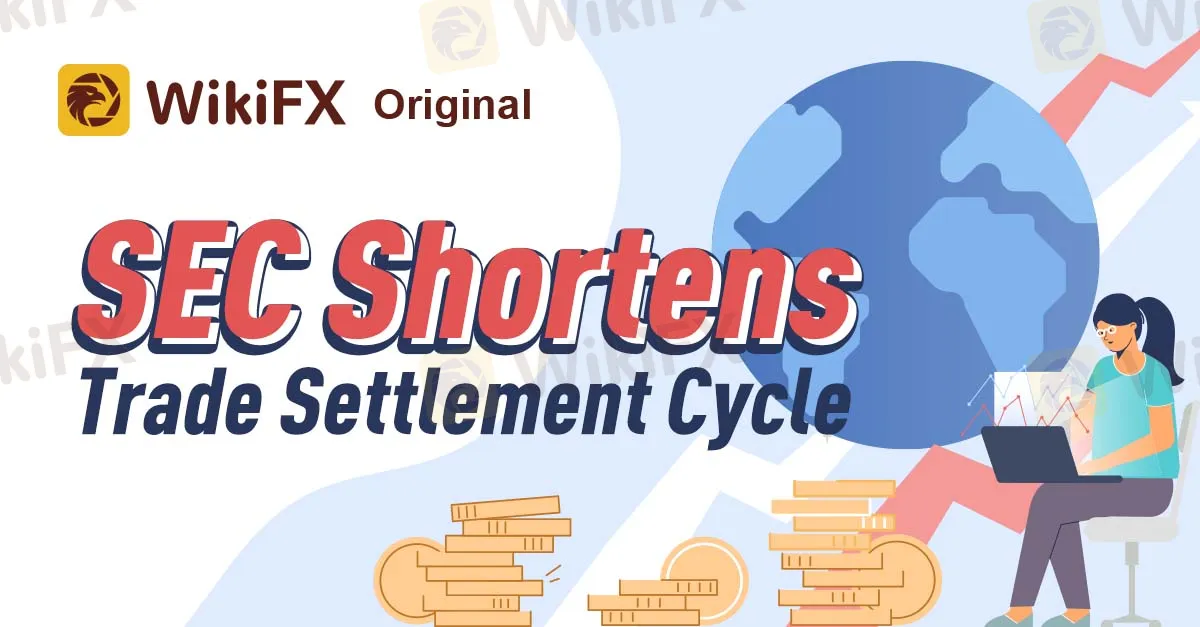简体中文
繁體中文
English
Pусский
日本語
ภาษาไทย
Tiếng Việt
Bahasa Indonesia
Español
हिन्दी
Filippiiniläinen
Français
Deutsch
Português
Türkçe
한국어
العربية
SEC Shortens Trade Settlement Cycle
Abstract:The usual settlement cycle for the majority of broker-dealer transactions in securities has been shortened by the SEC from two business days to one.

The United States Securities and Exchange Commission (SEC) has officially announced a new change to its broker-dealer securities transactions. Securities transactions ought to be settled within one business day (T+1) after a trade is made instead of two.
The securities regulator announced on Wednesday (15th January 2023) that this new switch will become effective 60 days after the finalised adjustments are made in the US Federal Register. It is reported that 28th May 2024 will be the deadline for the final rules.
The modification in regulations is aimed at assisting investors while decreasing the credit, market, and liquidity risks in securities transactions encountered by market participants.
The SEC acknowledged that bouts of higher market volatility experienced in 2020 and 2021 were a factor in the revisions when it published a thorough report on the situation. The regulator stated in the study that these incidents showcase the possible vulnerabilities that were not previously addressed in the US securities industry.
Furthermore, the SEC added a new requirement in relation to straight-through processing (STP) that applies to specific categories of clearing agencies that offer central matching services.
These final regulations will mandate registered investment advisers make and keep detailed records of allocations, confirmations and affirmations for certain securities transactions.
In accordance with the final rules, central matching service providers must establish, implement, uphold, and enforce new policies and practices that are logically curated to facilitate straight-through processing. Additionally, they must submit an annual report to the Commission outlining and quantifying their progress in this area.
“I support this rulemaking because it will reduce latency, lower risk, and promote efficiency and greater liquidity in the markets,” SEC Chair Gary Gensler said.
In 1993, the SEC made its first attempt towards standardising the securities settlement cycle when it established a policy requiring broker-dealers to settle securities transactions within three business days (T+3) whilst securities transactions had to be settled within five business days (T+5). In 2017, the regulator began enforcing the current T+2 practice from the standard T+3.
Alongside the shortening of settlement cycle, the SEC also proposed rule changes to strengthen protections of customer assets managed by registered investment advisers as well as a provision that is designated to revise the Privacy Act Rule in the federal government.

Disclaimer:
The views in this article only represent the author's personal views, and do not constitute investment advice on this platform. This platform does not guarantee the accuracy, completeness and timeliness of the information in the article, and will not be liable for any loss caused by the use of or reliance on the information in the article.
Read more

Why More People Are Trading Online Today?
Discover why online trading is booming with tech, AI, and a push for financial freedom. From stocks to crypto, it’s a thrilling hustle for all.

Bitpanda Secures Full Broker-Dealer License in Dubai
Bitpanda has officially obtained a full broker-dealer license from the Dubai Virtual Assets Regulatory Authority (VARA), marking a significant milestone in its international expansion. This approval, which follows preliminary authorization granted three months earlier, enables the European digital asset exchange to introduce its comprehensive suite of virtual asset services to investors in the United Arab Emirates (UAE).

RM457,000 Forex Fraud: Court Grants Conditional Release, Is Justice Delayed?
A Malaysian magistrate’s court has issued a discharge not amounting to acquittal (DNAA) for two former directors of an investment company implicated in a forex investment fraud case involving RM457,735.50.

Interactive Brokers Expands Crypto Trading with Solana, XRP, Cardano, and Dogecoin
Interactive Brokers adds Solana, XRP, Cardano, and Dogecoin to its platform, enabling U.S. and U.K. clients to trade crypto 24/7 with low fees.
WikiFX Broker
Latest News
Enlighten Securities Penalized $5 Million as SFC Uncovers Risk Control Failures
Why Are Financial Firms Adopting Stablecoins to Enhance Services and Stability?
Experienced Forex Traders Usually Do This Before Making a Lot of Money
Octa vs XM:Face-Off: A Detailed Comparison
When High Returns Go Wrong: How a Finance Manager Lost RM364,000
Bridging Trust, Exploring Best—WikiEXPO Hong Kong 2025 Wraps Up Spectacularly
Interactive Brokers Expands Crypto Trading with Solana, XRP, Cardano, and Dogecoin
Fidelity Investments Explores Stablecoin Innovation in Digital Assets Sector
Why More People Are Trading Online Today?
SEC Ends Crypto.com Probe, No Action Taken by Regulator
Currency Calculator







